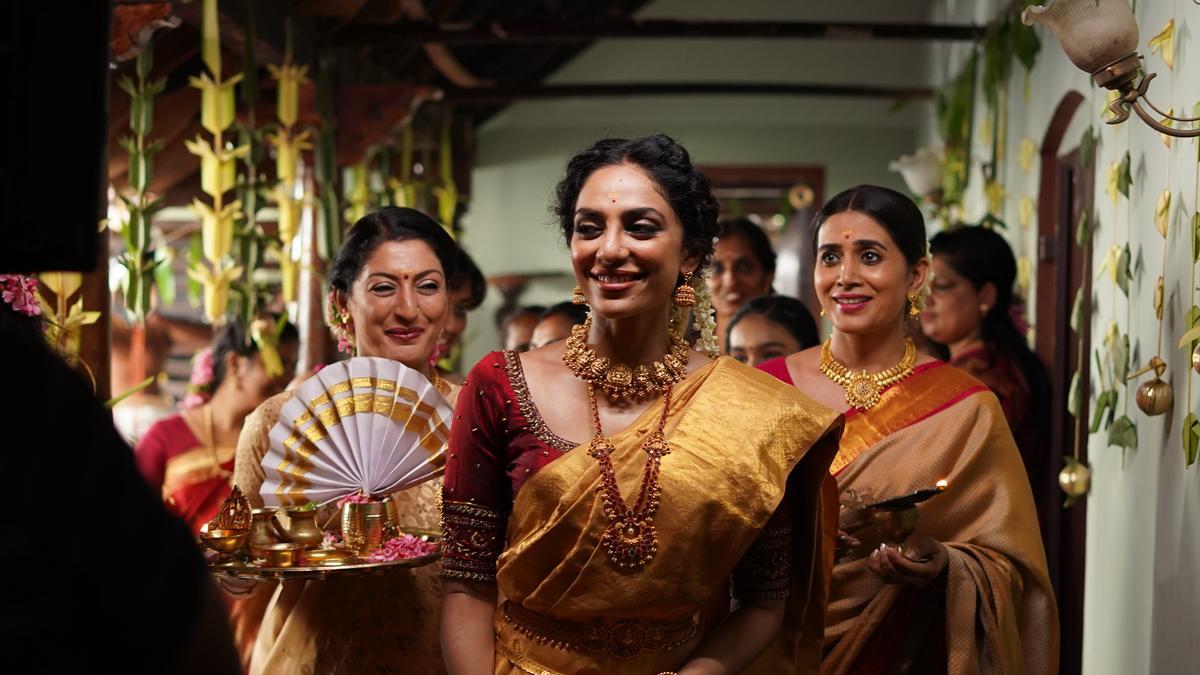
“Love, Sitara” opens with a poignant nod to the literary classic, Anna Karenina, with Sitara (played by Sobhita Dhulipala) quoting, “All happy families are alike; each unhappy family is unhappy in its own way.” This reference could set high expectations for the narrative, but Vandana Kataria’s film doesn’t quite reach the quotable heights of Tolstoy’s prose. The writing, however, does try earnestly, embodied through the pithy self-help aphorisms crafted by Abbas and Hussain Dalal: “Happiness lies in honesty,” “Dysfunction means they are making an effort,” and “I’ll fix myself, before I can fix my relationships.”
Sitara, or Tara, and Arjun (Rajeev Siddhartha), have been navigating a turbulent relationship for years. Both characters are portrayed as cosmopolitan and physically attractive individuals with ambitious careers—she’s an acclaimed interior designer, and he’s a chef on the verge of a significant career move to Singapore. Their fluctuating relationship hits an unexpected twist when Tara discovers she’s pregnant. Rather than informing Arjun directly, she proposes marriage. The subsequent family gathering in Kerala at her maternal grandmother’s home sets the stage for a series of events punctuated by comedy that is reminiscent of the film “2 States,” particularly over banana fritters and the arranging of an auspicious muhurat.
The comedic elements soon give way to more profound emotional turmoil. A significant pivot occurs when a friend comments on Tara’s uncharacteristic acceptance of marriage, noting that she had refused Arjun’s proposal three years earlier. The pregnancy has triggered a complex emotional journey for Tara, further complicated by emerging deceptions and family secrets, including potential issues in her parents’ marriage. This layered psychological landscape provides a rich setting for Sobhita Dhulipala, who has previously excelled in similar roles, such as the perceptive wedding planner Tara in Amazon Prime’s “Made in Heaven.”
Vandana Kataria, known for her nuanced directorial debut with “Noblemen” (2019), which dealt with bullying and toxic masculinity in a boarding school, shifts her focus to female-centric experiences in “Love, Sitara.” The screenplay by Sonia Bahl features prominent roles, including Sonali Kulkarni, and veteran theatre actor B.
. Jayashree who plays Tara’s endearingly eccentric grandmother. However, this new venture doesn’t match the psychological depth of Kataria’s previous work. While aiming for an authentic portrayal of emotional messiness, it sometimes seems restrained.
A notable pitfall in the film is the inconsistent writing, which oscillates between English and Hindi, peppered with Malayalam. This linguistic mix can feel contrived, as if the dialogue’s sole purpose is to deliver the right line at the right time, often leaning towards melodramatic or overly philosophical statements like, “A mistake can wreck a thousand lives,” and, “Hearts, like monuments, should be built of stone.” The family drama itself occasionally feels more staged than organic, with some characters veering into caricature territory—such as the talkative housemaid with an alcoholic husband.
In contrast, the penultimate scene of the film stands out with Tara and Arjun engaging in a heated argument that genuinely captures the essence of a couple with a shared history. This authenticity is a testament to the chemistry between Dhulipala and Siddhartha. Adding more layers to the narrative is Ikhlaque Khan, who expertly portrays Arjun’s father, a retired army man obsessed with notions of duty and patriotism, showcasing his range and depth as an actor.
Perhaps the most compelling character is Tara’s best friend Anjali, played by Tamara D’Souza. Anjali, an award-winning photojournalist covering human rights issues, brings a pragmatic yet supportive dynamic to Tara’s chaotic life, even using her camera skills to document the pre-wedding festivities—a clever and ironic subversion given the turmoil beneath the surface.
“Love, Sitara,” currently streaming on ZEE5, offers an engaging if somewhat flawed exploration of the complexities surrounding pre-wedding anxieties and family dynamics. The film’s nuanced attempt to blend humor, drama, and psychological insight provides a tapestry that, while not seamlessly woven, still holds the viewer’s interest. “Love, Sitara” may not be as profound or quotable as the literary work it references, but it carves out its own narrative space with its relatable exploration of human relationships and the often messy road to personal growth.
Published – September 27, 2024, 12:32 pm IST
Indian cinema / Hindi cinema / reviews












